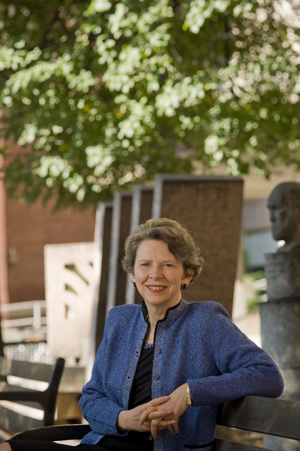School of Medicine Will Host Physicians for Human Rights: Call for global health curriculum tops weekend conference
As an undergraduate intern at the World Health Organization in Geneva, Elizabeth Park became convinced that global health issues should be planted firmly in the curricula of medical schools.

Now a volunteer for the BU chapter of Cambridge-based Physicians for Human Rights, Park (CAS’10, MED’13), who is enrolled in the Seven-Year Liberal Arts/Medical Education Program, hopes the group’s national conference at the School of Medicine on Saturday, February 20, will invigorate efforts to make international health, human rights, and global cultural awareness part of every future doctor’s education. About 150 students and educators have registered for the daylong event, which will culminate in a Town Hall Forum on Human Rights and Health Policy, open to the public and moderated by U.S. Representative James McGovern (D-Mass.).
“I want to believe that across the United States a movement is happening, that medical students want more global health in their curricula,” says Park, who emigrated from South Korea at age 11. She hopes that the students and faculty members who attend will be “the front-runners of the curriculum change movement on their campuses.” Lofty as the goal may seem, PHR is calling for a change in “the paradigm of medicine,” to incorporate human rights in the education of health professionals.
Founded in 1986, the nonprofit PHR attempts to shine a spotlight on the health consequences of human rights violations around the world, and mobilizes to try to stop them as well as to prevent future ones. The organization’s ongoing campaigns target torture, the Darfur crisis, the needs of AIDS sufferers in developing countries, and pleas for asylum in the United States for international victims of torture. PHR, which also has offices in Washington, D.C., shared the 1997 Nobel Peace Prize in its role as a coordinator of the International Campaign to Ban Landmines.
“Given Boston University’s long-standing record of expertise and leadership in the health and human rights movement, as well as the new Center for Global Health and Development, we are honored to team with the Boston University School of Medicine’s student chapter to host this unprecedented event,” says Hope O’Brien, PHR student program coordinator. “The students are not only the doctors, nurses, dentists, and public health specialists of tomorrow, they are already advocates for their patients’ rights, and the rights of others.
Karen Antman, dean of MED and provost of the Medical Campus, says the school is solidly behind the ideals of the conference. “We support the activity of our faculty and students in support of global human rights, and are honored to be hosting the 2010 PHR Conference on the Medical Campus, at the request of our students,” says Antman, who will deliver welcoming remarks with O’Brien. The keynote speaker, PHR cofounder and board chair Robert S. Lawrence, an associate dean and professor at Johns Hopkins School of Medicine and School of Public Health, will speak on Why Health Professionals Need Human Rights, and Vice Versa.
The conference will include strategy sessions, panel discussions, and skill development workshops, all reflecting the common goal of integrating human rights into medical education.
“There will be information on tangible skills and solutions to help lead your campus on this issue,” says PHR coordinator Danielle Fox, who shares Park’s excitement about the possibility that the BU-based proceedings will set a major change in motion. Fox cites a March 2009 study, published in PLoS one, an open access, online-only scientific journal from the Public Library of Science, led by a public health professor at the University of California at Berkeley, which concludes that while a majority of medical school deans “believe that knowledge about human rights is important in health practice … human rights education is lacking at most of their institutions.”
BU’s School of Public Health addresses global health concerns and pandemics, but Park fears that those topics get less attention than they deserve at the School of Medicine, which offers occasional lectures by experts such as Michael Grodin, an SPH professor of health law, bioethics, and human rights and cofounder of the BU-based Boston Center for Refugee Health and Human Rights, and George Annas, William F. Warren Distinguished Professor and chair of health law, bioethics, and human rights.
“I know that many patients at Boston Medical Center are from other countries, and a significant number of them have experienced torture,” says Park. “Clinical rotations in the first or second year that emphasize these patients’ needs would be great.”
Conference details can be found here.
This BU Today story was written by Susan Seligson. She can be reached at sueselig@bu.edu.